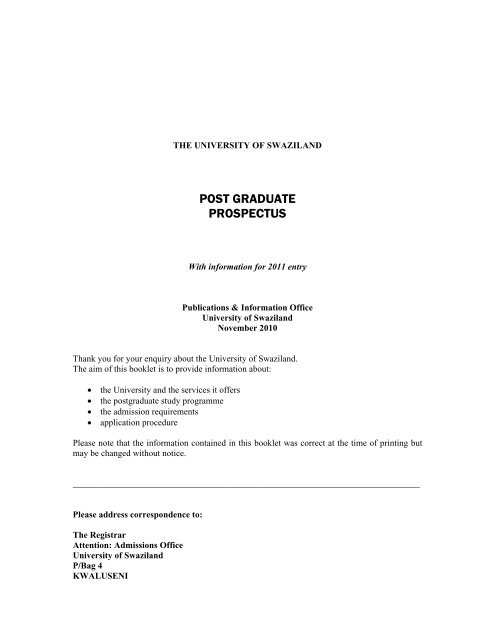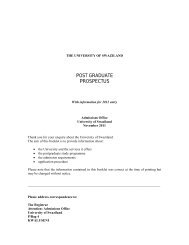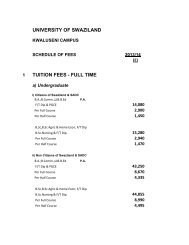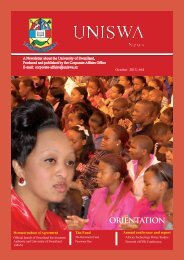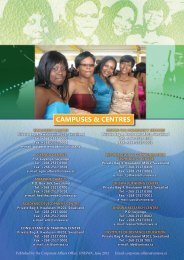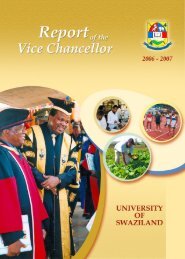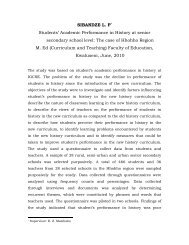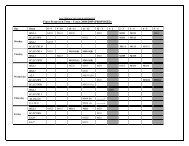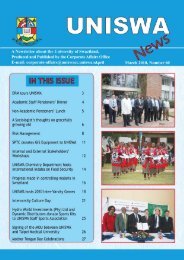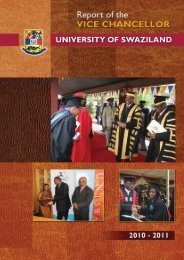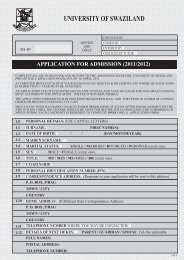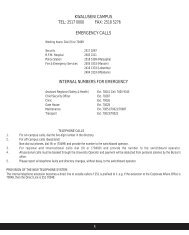POST GRADUATE PROSPECTUS
THE UNIVERSITY OF SWAZILAND
THE UNIVERSITY OF SWAZILAND
You also want an ePaper? Increase the reach of your titles
YUMPU automatically turns print PDFs into web optimized ePapers that Google loves.
THE UNIVERSITY OF SWAZILAND<strong>POST</strong> <strong>GRADUATE</strong><strong>PROSPECTUS</strong>With information for 2011 entryPublications & Information OfficeUniversity of SwazilandNovember 2010Thank you for your enquiry about the University of Swaziland.The aim of this booklet is to provide information about:• the University and the services it offers• the postgraduate study programme• the admission requirements• application procedurePlease note that the information contained in this booklet was correct at the time of printing butmay be changed without notice.______________________________________________________________________________Please address correspondence to:The RegistrarAttention: Admissions OfficeUniversity of SwazilandP/Bag 4KWALUSENI
BACKGROUND INFORMATIONHistorical NoteThe University of Swaziland developed from the University of Botswana, Lesotho and Swaziland(UBLS), formerly known as the University of Basutoland, Bechuanaland and Swaziland (UBBS),which had its headquarters in Lesotho between 1964 and 1975. The UBBS had developed fromthe Pius XII Catholic University College at Roma - so our history has quite deep roots. TheUniversity of Swaziland achieved its independent status as a fully-fledged university in 1982.Since achieving university status UNISWA has continued to grow and develop in accordancewith its stated aim of assisting national development.Student enrolment has risen steadily, paralleled by an ever-increasing output of graduates sincethe University’s first Congregation for the Conferment of Degrees in 1982. In all 9257 degreeshave been conferred, 618 of them at the 2006 Graduation. Since 1997, 111 masters degrees havebeen conferred, 7 of them in 2008.The chief mandate, which the university has tried to implement, is manpower production. This isclearly indicated in the type of programmes selected at the beginning, which still constitute amajor part of UNISWA programmes. Four levels, certificate, diploma, degree, masters weredeliberately structured so as to allow upward mobility and a second chance to those who leftschool at the lower levels.As it continues to evolve, the University of Swaziland is firmly committed to a programme ofexpansion and development to retain its relevance and the aim of providing the expert manpowerthat the Kingdom needs.1
GENERAL INFORMATION ON <strong>POST</strong><strong>GRADUATE</strong> PROGRAMMES OF STUDYThe University currently offers programmes leading to Master’s degrees in the variousdepartments as follows:• M.Sc. (Agric. & Applied Econ.) offered by the Department of Agricultural Economicsand Management• M.Sc (Agric. Ed.) offered by the Department of Agricultural Education and Extension• M.Sc (Agric. Ext) offered by the Department of Agricultural Education and Extension• M.Sc (Chem.) offered by the Department of Chemistry• M.Sc (Crop Science) offered by the Department of Crop Production• M.Sc. (Environmental Resource Management) areas of specialization are:- Biodiversity Conservation and Management – Biological Sciences Dept- Land and Water Resource Management - GEP- Livestock and Environment – Animal Science Department- Environmental Chemistry and Management – Chemistry Department- Environmental Crop Production – Crop Production Department- Agricultural & Biosystems Engineering -Agric. & BiosystemsEngineering Department• M.Ed (Curriculum and Teaching) offered by the Department of Curriculum and Teaching• M.Ed (Educational Foundation and Management) offered by the Department ofEducational Foundation and Management• M.A (History) offered by the Department of History• M.Ed. (Adult Education) offered by the Department of Adult EducationNew programmes are announced in due course after approval during the course of the year. TheMasters programmes are by course work and thesis and can be pursued either on a full-time orpart-time basis. The maximum duration for the full-time study is three academic years with thefirst year devoted to taught courses and the second year to research and thesis writing. For parttimethe maximum duration is four years, two years of which is used for the taught courses andthe third year for research and thesis writing.Admission requirementsQualifications for entrance to a master’s programme would normally be a Bachelor’s Degree inthe relevant subject. The specific requirements are stipulated in the Special DepartmentalRegulations. Applications for admission to a Master’s programme are processed by TheAdmissions Office in the Registrar’s Office. All applications should be directed to this office andNOT to the respective departments. The office concerned, after receipt of an application, throughthe Co-ordinator’s office, contacts the relevant department which makes recommendations.RegistrationPostgraduate students normally register each semester at the beginning of each semester year.Details about the schedule of registration are announced by the Registrar’s office prior toregistration.2
In addition to the definition of a student as indicated in the University of Swaziland Act, a fulltimeMaster’s degree student doing course work, shall register for a minimum of 12 credithours, and six credit hours, when doing thesis workIn addition to the definition of a student as indicated in the University of Swaziland Act, a parttimeMaster’s student, doing course work, shall register for a minimum of six credit hours; andalso a minimum of six credit hours, when doing thesis work.A research methods course (quantitative and/or qualitative) and Seminar shall be two of theprescribed core courses for all Master’s degree students at the University of Swaziland.A student shall write a paper in his/her major area of study and present it in a seminar. Both theoral and the written components shall be graded.ASSESSENTAll courses will be assessed by a combination of continuous assessment andexamination. Each course will be examined at the end of each semester by one finalexamination paper of three hours duration. There will be no supplementaryexaminations. An oral examination will be conducted by a committee as laid out bythe University Regulations. The thesis will be considered to constitute a subject whichmay either be passed or failed and will be examined as recommended in the UniversityRegulationsThe ratio of continuous assessment to examination shall be 1:1. Continuousassessment in each course shall consist of assignments, tests reports, seminarpresentations and other appropriate assessments.Supplementary ExaminationThere shall be no supplementary examinations, except as provided for the thesisPROGRESSIONTo proceed from semester to semester, a student must obtain an overall aggregate of at least50% at the end of each semester. This excludes all the ‘exemption’ courses.If a student obtains an average of at least 50% but fails some courses, such a student shall beallowed to proceed and carry the failed course and take it when it is next offeredA student who obtains an average of at least 50% but fails a course in the final semester of thecourse work, such a student may be allowed to proceed and carry the failed course; and take itwhen it is next offered, and be allowed to commence on research work.A. Academic ServicesThe University offers the following academic services:A.1 Library ServicesThe University Library offers a range of services suitable for Postgraduate studies and research.The Library operates two decentralised units at the Kwaluseni and Luyengo campus, in order toensure easy and speedy access to resources. The Library holds an interesting collection ofpublications and documents related to Swaziland. Reference staff is available to provide answersto queries and advice on the use of the library materials for information needs. Details of Libraryoperations are available in the Library guide obtainable from the Library on request.A.2 Computing Services4
The University has a Computing Centre that serves the University community and providesaccess to computing facilities. The Centre operates independently from the Faculties to ensureequal service to academic users. It is for this reason that the Centre has staff employed to attendto users’ needs.To support and enhance post-graduate student course and research work, the Institute of Post-Graduate Studies has two computer labs each equipped with five computers and a printer in theCommerce Building at the Kwaluseni Campus. There are also three computers in the LuyengoCampus in the Library in the studying cubicles. At the Luyengo Campus there are postgraduatestudent offices, classrooms and a mini computer office all under one roof.There are plans to link the three campuses, (only two campuses are involved in Post-Graduatestudies) locally as well as with other institutions in and outside the country.B. Student WelfareB.1 AccommodationThe University converted an existing undergraduate hostel into a postgraduate students residencefor full-time postgraduate students at the Luyengo Campus. The rooms are suitable for singleoccupancy and hence suitable for single students. The University regrets that there is presentlyno suitable accommodation for married students and families. The hostel has four separatebathrooms and a lounge.B.2 Office SpaceThere is a limited number of offices for post-graduate students on the Luyengo Campus. Nooffice space for post-graduate students on the Kwaluseni Campus.B.3 CateringThe University currently provides a range of catering services. The refectory has been improvedto include a refurbished servery and dining room area with new improved equipment. Thisprovides a relatively independent catering service and allows students to plan their meals, as theydesire. Users can plan and arrange to have meals ranging from snacks to full meals. Vendingmachines are also available and operate between 7.30a.m and 5.00p.m at suitable points.B.4 Sports and RecreationRecreation and sports facilities are available on both campuses. These include facilities for arange of sports from which the students may choose. At the Kwaluseni campus the multipurposehall serves as an indoor sporting facility for selected sporting activities. Students are responsiblefor planning their own sporting activities to suit their interests.B.5 Health ServicesThe University operates clinics at both campuses staffed by qualified personnel. The staffmembers are available to offer advice. A medical practitioner is also available on a part-timebasis.B.6 ChaplaincyAs part of the University’s commitment to balanced welfare for students, there is freedom ofworship participation in spiritual activities. A chapel is available at the Kwaluseni campus formeetings which are arranged by various Christian groups.5
DEPARTMENT OF AGRICULTURALEDUCATION AND EXTENSIONMaster of Science in Agricultural EducationPreambleSubject to the General Regulations, the following Special Regulations shall apply.Entrance RequirementsThe normal requirements for entry into the Master’s programme shall be a Bachelor’s degree inAgricultural Education, or any recognised university degree equivalent, with at least a secondclass second division, from UNISWA, or any other recognized university equivalent, with aminimum average of a C grade (60%) in Agricultural Education courses.First SemesterCore Courses L P CrAEM 102 Introduction to Computers 2L 2PAEE 601 Educational Research Methods 3L 0P 3.0AEE 603 Teaching: Theory and Practice Analysis 3L 0P 3.0AEE 609 Development Support Communication 3L 0P 3.0AEE 607 Youth and Adult Life Long Learning 3L 0P 3.0AEE 699: Master’s Thesis 6.0Elective CoursesAEE 625 Curriculum Theory and Innovations 3L 0P 3.0AEE 611 Innovation Development and Application 3L 0P 3.0Second SemesterCore CoursesAEE 602 Data Analysis and Interpretation 3L 0P 3.0AEE 604 Leadership, Supervision, and Management 3L 0P 3.0AEE 606 Environmental Education 3L 0P 3.0AEM 618 Applied Economic Analysis 2L 2P 3.3AEE 690 Seminar 0L 3P 2.0AEE 699: Master’s Thesis 6.0Elective CoursesAEE 608 Cognition and Capacity Development 3L 0P 3.0AEE 622 Theory and Practice of Counselling 3L 0P 3.0AEE 612 Agricultural Knowledge Systems 3L 0P 3.0Master of Science in Agricultural ExtensionPreambleSubject to the General Regulations, the following Special Regulations shall apply.Entrance RequirementsThe normal requirements for entry into the Master’s programme shall be a Bachelor’s degree inAgricultural Extension/Agriculture or any recognised University equivalent, with at least asecond class second division, from UNISWA, or any other recognized university equivalent, witha minimum average of a C grade (60%) in Agricultural Extension courses.6
First SemesterCore Courses L P CrAEM 102 Introduction to Computers 2L 2PAEE 601 Educational Research Methods 3L 0P 3.0AEE 609 Development Support Communication 3L 0P 3.0AEE 607Youth and Adult Life-long Learning 3L 0P 3.0AEE 613 Agricultural Management and Supervision 3L 0P 3.0AEE 699 Master’s Thesis 6.0Elective CoursesAEE 611 Innovation Development and Application 3L 0P 3.0AEE 615 Sustainable Development 3L 0P 3.0AEE 619 Rural Development 3L 0P 3.0AEE 621 Extension Systems and Methods 3L 0P 3.0Second SemesterCore CoursesAEE 602 Data Analysis and Interpretation 3L 0P 3.0AEE 606 Environmental Education 3L 0P 3.0AEE 614 Programme Planning, Monitoring and Evaluation 3L 0P 3.0AEE 616 Social Theory, Social Change and Development 3L 0P 3.0AEE 690 Seminar 0L 3P 2.0AEE 699 Master’s Thesis 6.0Elective CoursesAEE 612 Agricultural Knowledge Systems 3L 0P 3.0AEE 618 Rural Social Institutions and Organizations 3L 0P 3.0.7
DEPARTMENT OF AGRICULTURALECONOMICS AND MANAGEMENTMaster of Science In Agricultural and Applied EconomicsPreambleSubject to the AcademicGeneral Regulations for Masters’ degrees the following SpecialRegulations shall apply.Entrance RequirementsThe minimum entry requirements for the M.Sc (Agricultural and Applied Economics) degreeshall be a Bachelor’s degree in Economics or Agricultural Economics or Agriculture orAgricultural Education from UNISWA or any other recognised institution with at least a secondclass, second division pass [2(ii)] and a C grade (60%) in Economics or Agricultural Economicscourses.A. AGRIBUSINESS MANAGEMENT OPTIONFirst SemesterCore courses L P CrAEM 601 Microeconomics 3L 0P 3.0AEM 617 Institutional and Behavioural Economics 2L 0P 3.0AEM 603 Statistics for Economists 2L 2P 3.3AEM 605 Econometrics 2L 2P 3.3AEM 606 Mathematics for Economists 2L 2P 3.3AEM 607 Production Economics 2L 0P 2.0AEM 699 Master’s Thesis 6.0Second SemesterCore coursesAEM 604 Research Methodology 3L 0P 3.0AEM 690 Seminar on issues in Agricultural and Applied Economics 0L 2P 1.3AEM 609 Agribusiness Management 3L 0P 3.0AEM 602 Macroeconomics 3L 0P 2.0AEM 699 Master’s Thesis 6.0B. AGRICULTURAL POLICY AND TRADE OPTIONFirst SemesterCore coursesAEM 601 Microeconomics 3L 0P 3.0AEM 617 Institutional and Behavioural Economics 2L 0P 3.0AEM 603 Statistics for Economists 2L 2P 3.3AEM 605 Econometrics 2L 2P 3.3AEM 606 Mathematics for Economists 2L 2P 3.3AEM 607 Production Economics 2L 0P 2.0AEM 699 Master’s Thesis 6.08
Second SemesterCore coursesAEM 604 Research Methodology 3L 0P 3.0AEM 690 Seminar on issues in Agricultural and Applied Economics 0L 2P 1.3AEM 612 Agricultural Policy and Trade 3L 0P 3.0AEM 602 Macroeconomics 3L 0P 2.0AEM 699 Master’s Thesis 6.0C. AGRICULTURE AND RURAL DEVELOPMENT OPTIONFirst SemesterCore coursesAEM 601 Microeconomics 3L 0P 3.0AEM 617 Institutional and Behavioural Economics 2L 0P 3.0AEM 603 Statistics for Economists 2L 2P 3.3AEM 605 Econometrics 2L 2P 3.3AEM 606 Mathematics for Economists 2L 2P 3.3AEM 607 Production Economics 2L 0P 2.0AEM 699 Master’s Thesis 6.0Second SemesterCore coursesAEM 604 Research Methodology 3L 0P 3.0AEM 690 Seminar on issues in Agricultural and Applied Economics 0L 2P 1.3AEM 615 Agricultural and Rural Development 3L 0P 3.0AEM 602 Macroeconomics 3L 0P 2.0AEM 699 Master’s Thesis 6.0ELECTIVE COURSES [FOR ALL OPTIONS – a student takes a minimum ofsix credits]Second SemesterElectives coursesAEM 610 Agribusiness Supply Chain Management 2L 0P 2.0AEM 611 Agricultural Finance Management 2L 0P 2.0AEM 613 Quantitative Analysis of Agricultural Policies 2L 0P 2.0AEM 614 International Trade and Policy 2L 0P 2.0AEM 616 Farm Management and Production 2L 2P 3.3AEM 618 Applied Economic Analysis 2L 2P 3.3.9
Master of Science in ChemistryDEPARTMENT OF CHEMISTRYPreambleSubject to the General Regulations, the following Special Regulations shall apply.Entrance RequirementsThe minimum entry requirement for the M.Sc in Chemistry degreeshall be a B.Sc. degree, fromUNISWA or any other recognized institution, with at least a second class second division pass ofeither a single major B.Sc programme or a combined major B.Sc programme with a minimumaverage of a C grade (60%) in Chemistry in either case.NATURAL PRODUCTS AND MEDICINAL CHEMISTRY OPTIONFirst Semester L P CrCore coursesCSF100 Computer Foundation Course 2L 2PC690 Seminar 0L 3P 2.0C601 Chemotherapy 0L 3P 2.0C602 Methods of Organic Synthesis 3L 0P 3.0C604 Natural Products I 3L 0P 3.0C612 Spectro-analytical Methods 3L 0P 3.0Electives coursesC606 Special Topics in Natural Products and Medicinal Chemistry 3L 0P 3.0C617 Bio-Inorganic Chemistry 3L 0P 3.0Second SemesterCore coursesC603 Applied Spectroscopy 3L 0P 3.0C610 Research Methods in Chemistry 3L 0P 3.0C611 Separation Methods 3L 0P 3.0C650 Instrumental Techniques in Chemistry 0L 6P 4.0C699 Master’s Thesis 6.0Electives coursesC605 Natural Products II 3L 0P 3.0C607 Traditional Medicine 3L 0P 3.0C615 Special Topics in Environmental/Analytical Chemistry 3L 0P 3.010
DEPARTMENT OF CROP PRODUCTIONMaster of Science in Crop SciencePreambleSubject to the Academic General Regulations for the postgraduate degrees, the following specialshall apply.Entrance RequirementsThe minimum entrance requirement for the M.Sc (Crop Science) degree shall be a B.Sc degree inAgriculture (Crop Production Option or Horticulture Option) or a B.Sc. degree in Agronomyfrom UNISWA or any other recognised institution with at least a second class second divisionpass and at least an average of a C grade (60%) in Crop Production or in Horticulture courses.First Semester L P CrCore coursesAEM 102: Introduction to Computers 2L 2PCP 601: Crop Physiology in Relation to Agricultural Productivity 3L 0P 3.0CP 612: Research Methods and Experimental Design 3L 2P 4.3CP 615: Soil Chemistry and Fertility 3L 2P 4.3CP 699: Master’s Thesis 6.0Electives coursesCP 602: Stress physiology 3L 2P 4.3CP 616: Post-harvest Crop Protection 3L 2P 4.3CP 619: Seed Science 3L 2P 4.3Second SemesterCore coursesCP 609: Cropping Systems in the Semi-arid Tropics 2L 3P 4.0CP 690: Seminar 0L 2P 1.3CP 614: Crop Genetics and Breeding 3L 2P 4.3HORT 601: Plant Biotechnology 3L 2P 4.3CP 699: Master’s Thesis 6.0Electives coursesCP 617: Weed Science 3L 2P 4.3CP 618: Sustainable Crop Production 3L 2P 4.3CP 620: Agricultural Entomology 3L 2P 4.3CP 621: Phytopathology 3L 2P 4.312
DEPARTMENT OF BIOLOGICAL SCIENCESThe Department of Biological Sciences coordinates the following degree which is offered by differentDepartments in the UniversityMaster of Science in Environmental Resources ManagementPreamble:Subject to the provisions of the Academic General Regulations for Master’s programmes, thefollowing special regulations) shall apply.Entrance RequirementsThe minimum entry requirement for the M.Sc. (Environmental Resources Management) shall beeither a B.Sc. degree or a B.A. degree (with Majors in any of the following: Biology, Chemistry,Geography, Environmental Science and Planning, or any other relevant area) or a B.Sc. degree(Agriculture or agriculture related field) from UNISWA or any other recognised institution, withat least a Second Class (Second Division) of either a single subject major degree programme or acombined subject major degree programme. In addition, a minimum average mark of a C grade(60%) in the option of interest is required.AREA OF SPECIALIZATION “A”Biodiversity Conservation and Management (Department of Biological Sciences)First Semester L P CrCore coursesCSF 100 Computer Foundation Course 2L 2PERM 601 Environmental Management and Resource Economics 3L 0P 3.0ERM 602 GIS and Spatial Analysis 3L 2P 4.3ERM 603 Environmental Pollution 3L 0P 3.0ERM 604 Environmental Law 3L 0P 3.0ERM 690 Seminar 0L 2P 1.3ERM 699 Master’s Thesis 6.0Second SemesterCore coursesERM 610 Biological Research Techniques 3L 0P 3.0ERM 611 Biological Resources Management 3L 0P 3.0ERM 612 African Ecology and Conservation 3L 0P 3.0ERM 613 Microbes as a Resource 3L 0P 3.0ERM 699 Master’s Thesis 6.013
AREA OF SPECIALIZATION “B”Land and Water Resources Management (Department of Geography, EnvironmentalScience and Planning).First SemesterCore coursesCSF 100 Computer Foundation Course 2L 2PERM 601 Environmental Management and Resource Economics 3L 0P 3.0ERM 602 GIS and Spatial Analysis 3L 2P 4.3ERM 603 Environmental Pollution 3L 0P 3.0ERM 604 Environmental Law 3L 0P 3.0ERM 690 Seminar 0L 2P 1.3ERM 699 Master’s Thesis 6.0Second SemesterCore coursesERM 620 Development, Urban Systems and the Environment 3L 0P 3.0ERM 622 Land and Water Resources Planning and Management 3L 0P 3.0ERM 624 Environmental Geomorphology 3L 0P 3.0ERM 699 Master’s Thesis 6.0AREA OF SPECIALIZATION “C”Agricultural & Biosystems Engineering (Department of Agric. & Biosystems Eng.).First SemesterCore coursesCSF 100 Computer Foundation Course 2L 2PERM 601 Environmental Management and Resource Economics 3L 0P 3.0ERM 602 GIS and Spatial Analysis 3L 2P 4.3ERM 603 Environmental Pollution 3L 0P 3.0ERM 604 Environmental Law 3L 0P 3.0ERM 690 Seminar 0L 2P 1.3ERM 699 Master’s Thesis 6.0Second SemesterCore coursesERM 663 Integrated Water Resources Management 2L 2P 3.3ERM 664 Land Resources Management 2L 2P 3.3ERM 665 Impact Assessment of Agricultural Projects 2L 2P 3.3ERM 666 Research Techniques in Agricultural and Biosystems Engineering 2L 0P 2.0ERM699 Master’s Thesis 6.014
AREA OF SPECIALIZATION “D”Livestock and Environment (Department of Animal Science).First SemesterCore coursesCSF 100 Computer Foundation Course 2L 2PERM 601 Environmental Management and Resource Economics 3L 0P 3.0ERM 602 GIS and Spatial Analysis 3L 2P 4.3ERM 603 Environmental Pollution 3L 0P 3.0ERM 604 Environmental Law 3L 0P 3.0ERM 690 Seminar 0L 2P 1.3ERM 699 Master’s Thesis 6.0Second SemesterCore coursesERM 630 Animal Production Systems 3L 0P 3.0ERM 631Animal Welfare and Legislation 3L 0P 3.0ERM 632 Rangeland Management 3L 0P 3.0ERM 634 Animal Production Research Techniques 3L 0P 3.0ERM 699 Master’s Thesis 6.0AREA OF SPECIALIZATION “E”Environmental Chemistry and Management (Department of Chemistry).First SemesterCore coursesCSF 100 Computer Foundation Course 2L 2PERM 601 Environmental Management and Resource Economics 3L 0P 3.0ERM 602 GIS and Spatial Analysis 3L 2P 4.3ERM 603 Environmental Pollution 3L 0P 3.0ERM 604 Environmental Law 3L 0P 3.0ERM 690 Seminar 0L 2P 1.3ERM 699 Master’s Thesis 6.0Second SemesterCore coursesERM 640 Environmental Chemistry 3L 0P 3.0ERM 641 Chemical Pollution Studies 3L 0P 3.0ERM 642 Environmental, Analytical Research Techniques 3L 0P 3.0ERM 644 Chemistry Research Techniques 3L 0P 3.0ERM 699 Master’s Thesis 6.015
AREA OF SPECIALIZATION “F”Environmental Crop Production (Department of Crop Production).First SemesterCore coursesCSF 100 Computer Foundation Course 2L 2PERM 601 Environmental Management and Resource Economics 3L 0P 3.0ERM 602 GIS and Spatial Analysis 3L 2P 4.3ERM 603 Environmental Pollution 3L 0P 3.0ERM 604 Environmental Law 3L 0P 3.0ERM 699 Master’s Thesis 6.0Second SemesterCore coursesERM 654 Soil Chemistry and Fertility 3L 2P 4.3ERM 653 Cropping Systems in the Semi-arid Tropics 3L 2P 4.3ERM 655 Research Methods and Experimental Design 2L 3P 4.3ERM 690 Seminar 0L 2P 1.3ERM 699 Master’s Thesis 6.0ELECTIVE COURSES [FOR ALL OPTIONS – a student takes a minimum ofsix credits]Second SemesterERM 614 Bio Control and Ecosystems 3L 0P 3.0ERM 621 Climate Change And Environment 3L 0P 3.0ERM 633 Environmental Impacts of Livestock Production 3L 0P 3.0ERM 645 Special Topics In Environmental/Analytical Chemistry 3L 0P 3.0ERM 653 Cropping Systems In The Semi-arid Tropics 3L 0P 3.0ERM 656 Crop Physiology in Relation to Agricultural Productivity 3L 0P 3.0ERM 650 Stress Physiology 3L 2P 4.3ERM 657 Post Harvest Crop Protection 3L 2P 4.3ERM 658 Weed Science 3L 2P 4.3ERM 659 Sustainable Crop Production 3L 0P 3.0ERM 660 Seed Science 3L 2P 4.3ERM 661 Agricultural Entomology 2L 3P 4.3ERM 662 Phytopathology 2L 3P 4.3ERM 667 Agricultural and Farm Waste Management 2L 2P 3.3ERM 668 Drainage and Waste Water Management 2L 2P 3.316
Master of Arts in HistoryDEPARTMENT OF HISTORYPreambleSubject to the General Regulations, the following Special Regulations shall apply.Entrance RequirementsThe minimum entry requirements for the M.A. (History) degree shall be a B.A. degree in whichHistory is one of the majors from UNISWA or any other recognised institution with at leastsecond class second division with a minimum average mark of a C grade (60%) in History.First Semester L P CrCore coursesCFCH100 Computer Foundations CourseH610 Research Methods in History 3L 0P 3.0H611 Themes in the Pre-colonial History of Swaziland 3L 0P 3.0H613 Introduction to the Historiography of Southern Africa 3L 0P 3.0H615 Comparative History of Revolutions 3L 0P 3.0H699 Master’s Thesis 6.0Elective courses 3L 0P 3.0H616 Economic History of Africa in Early Historical Times. 3L 0P 3.0H618 Comparative History of Slavery: Ancient and New World3L 0P 3.0SlaveryH620 Theory and History of Capitalism and Imperialism 3L 0P 3.0H622 Comparative History of the Peasantry 3L 0P 3.0Second SemesterCore courses 3L 0P 3.0H612 Themes in the Colonial and Post-colonial History of Swaziland 3L 0P 3.0H614 Themes in the Historiography of Southern Africa 3L 0P 3.0H690 Seminar in Historical Topics 0L 3P 2.0H626 Text Analysis in History 3L 0P 3.0H699 Master’s Thesis 6.0Elective coursesH617 Economic History of Africa in Post-colonial Times 3L 0P 3.0H619 Comparative History of Slavery: Slavery in Africa 3L 0P 3.0H621 Politics in Africa since 1945 3L 0P 3.0H623 Gender and Society in Africa 3L 0P 3.0H624 Comparative Labour History 3L 0P 3.017
DEPARTMENT OF ADULT EDUCATIONMaster of Education in Adult EduationPREAMBLESubject to the Academic General Regulations for Master’s degrees the following SpecialRegulations shall apply:ENTRANCE REQUIREMENTSThe minimum entry requirements for the M.Ed. (Adult Education) degree shall be a Bachelor’sdegree in Adult Education or a Bachelor of Education with Adult and Continuing EducationOption from UNISWA or any other recognised institution with at least a Second Class, SecondDivision pass (2 (ii)) and with a C grade (60%) in Adult Education or adult &\and ContinuingEducation courses.First Semester L P CrCore CoursesEDF 102 Introduction to Computing for Education 2 2MAE 601 Measurement & Evaluation 3 0 3.0MAE 602 Social Psychology of Adult Education 3 0 3.0MAE 606 Communication in Adult Education 3 0 3.0EDF 650 Quantitative Research Methods 3 2 4.3MAE 699 Master’s ThesisElectivesMAE 607 Counselling & Guidance in Adult Education 3 0 3.0MAE 608 Community Development & Literacy 3 0 3.0Second Semester 6.0Core coursesMAE 604 Instructional Design & Technology 3 2 4.3MAE 605 Management of Resources 3 0 3.0EDF 651 Qualitative Research Methods 3 2 4.3MAE 690 Seminar 0 3 2.0MAE 699 Master’s Thesis 6.0ElectivesMAE 609 Gender & Population in Adult Education 3 0 3.0MAE 610 Management of Public Enterprises 3 0 3.0MAE 611 Small-Scale Business Management 3 0 3.018
DEPARTMENT OF CURRICULUM AND TEACHINGMaster of Education in Curriculum and TeachingPreambleSubject to the provisions of General Regulations for Master’s degrees in the University, thefollowing special regulations of the Department of Curriculum and Teaching shall apply.Entrance Requirements(a) The minimum entry requirement for the Master of Education in Curriculum and Teachingshall be a Bachelor of Education degree or a Bachelor’s degree with Education as a majorsubject, from UNISWA or any other recognized institution, with at least a second classsecond division pass, and a minimum average mark of a C grade (60%) in Educationcourses.AND(b) Completed at least two years of professional experience in Education.OPTION A: LANGUAGES EDUCATION SPECIALIZATIONFirst Semester L P CrCore coursesEDF 102 Introduction to Computing in Education 1L 1PEDC 607 Curriculum Theory 3L 0P 3.0EDF 650 Quantitative Methods of Research 3L 2P 4.3EDC 634 Curriculum Studies: English I 3L 0P 3.0EDF 699 Master’s Thesis 6.0Second SemesterCore coursesEDF 102 Introduction to computing for Education 1L 1PEDC 608 Curriculum Development 3L 0P 3.0EDF 651 Qualitative Methods of Research 3L 2P 4.3EDC 635 Curriculum Studies: English II 3L 0P 3.0EDC 690 Seminar 0P 2P 1.3EDF 699 Master’s Thesis 6.0OPTION B: SOCIAL STUDIES EDUCATION SPECIALIZATIONFirst SemesterCore coursesEDF 102 Introduction to Computing in Education 1L 1PEDC 607 Curriculum Theory 3L 0P 3.0EDF 650 Quantitative Methods of Research 3L 2P 4.3EDC 636 Curriculum Studies: Religious Education I 3L 0P 3.0EDC 638 Curriculum Studies: History I 3L 0P 3.0EDC 641 Curriculum Studies: Geography I 3L 0P 3.0EDF 699 Master’s Thesis 6.019
Second SemesterCore coursesEDC 608 Curriculum Development 3L 0P 3.0EDF 651 Qualitative Methods of Research 3L 2P 4.3EDC 637 Curriculum Studies: Religious Education II 3L 0P 3.0EDC 639 Curriculum Studies: History II 3L 0P 3.0EDC 642 Curriculum Studies: Geography II 3L 0P 3.0EDC 690 Seminar 0P 2P 1.3EDF 699 Master’s Thesis 6.0OPTION C: SCIENCE/ MATHEMATICS EDUCATION SPECIALIZATIONFirst SemesterCore coursesEDF 102 Introduction to Computing in Education 1L 1PEDC 607 Curriculum Theory 3L 0P 3.0EDF 650 Quantitative Methods of Research 3L 2P 4.3EDC 646 Curriculum Studies: Chemistry I 3L 0P 3.0EDF 699 Master’s Thesis 6.0Second SemesterCore coursesEDC 608 Curriculum Development 3L 0P 3.0EDF 651 Qualitative Methods of Research 3L 2P 4.3EDC 647 Curriculum Studies: Chemistry II 3L 0P 3.0EDC 690 Seminar 0P 2P 1.3EDF 699 Master’s Thesis 6.0ELECTIVE COURSES [FOR ALL OPTIONS – a student to take a minimumof six credits]First SemesterEDC 609 Research on Teaching 3L 0P 3.0EDC 611 Curriculum Development, Teaching and Learning for Sustainable3L 0P 3.0DevelopmentEDC 613 Language and Communication 3L 0P 3.0Second SemesterEDC 610: Classroom Ecology and Observation 3L 0P 3.0EDC 612 Educational Assessment: Principles and Practice 3L 0P 3.0EDC 614 The Gender-sensitive Curriculum 3L 0P 3.020
DEPARTMENT OF EDUCATIONAL FOUNDATIONS ANDMANAGEMENTMaster of Education in Educational Foundations and ManagementSubject to the Academic General Regulations for Master’s degree, the following specialregulations shall apply.Entrance Requirements(b) The minimum entry requirement for the Master of Education in Educational Foundationsand Management shall be a Bachelor of Education degree from UNISWA or any otherrecognized institution, with at least a second class second division pass, and a minimumaverage mark of a C grade (60%) in Education courses.AND(b) Completed at least two years of professional experience in Education.OPTION A: EDUCATIONAL ADMINISTRATIONFirst Semester L P CrCore coursesEDF 102 Introduction to Computing in Education 1L 1PEDF 650 Quantitative Methods of Research 3L 2P 4.3EDF 626 The Beginnings of Administrative Thought 3L 0P 3.0EDF 634 Planning Theory and Practice in Education 3L 0P 3.0EDF 699 Master’s Thesis 6.0Second SemesterCore coursesEDF 651 Qualitative Methods of Research 3L 2P 4.3EDF 627 Contemporary Approaches to Administration 3L 0P 3.0EDF 635 Management Theory and Practice in Education 3L 0P 3.0EDF 690 Seminar 0L 2P 1.3EDF 699 Master’s Thesis 6.0OPTION B: GUIDANCE AND COUNSELLINGFirst SemesterCore coursesEDF 102 Introduction to Computing in Education 1L 1PEDF 650 Quantitative Methods of Research 3L 2P 4.3EDF 632 Fundamentals of Guidance 3L 1P 3.6EDF 644 Special Education 3L 0P 3.6EDF 699 Master’s Thesis 6.0Second SemesterCore coursesEDF 651 Qualitative Methods of Research 3L 2P 4.3EDF 633 Fundamentals of Counselling 3L 1P 3.3EDF 655 Understanding Learning Disabilities 3L 1P 3.3EDF 690 Seminar 0L 2P 1.3EDF 699 Master’s Thesis 6.021
OPTION C: PSYCHOLOGY OF EDUCATONFirst SemesterCore coursesEDF 102 Introduction to Computing in Education 1L 1PEDF 650 Quantitative Methods of Research 3L 2P 4.3EDF 624 Concepts of Learning 3L 0P 3.0EDF 630 Physical, Social and Personality Development of the Child 3L 0P 3.0EDF 628 Tools of Measurement and Evaluation 3.0EDF 699 Master’s Thesis 6.0Second SemesterCore coursesEDF 651 Qualitative Methods of Research 3L 2P 4.3EDF 625 Theories of Learning 3L 0P 3.0EDF 631 Cognitive and Moral Development of the Child 3L 0P 3.0EDF 690 Seminar 0L 2P 1.3EDF 699 Master’s Thesis 6.0OPTION D: SOCIOLOGY OF EDUCATIONFirst SemesterCore coursesEDF 102 Introduction to Computing in Education 1L 1PEDF 650 Quantitative Methods of Research 3L 2P 4.3EDF 622 Perspectives in Sociology of Education 3L 0P 3.0EDF 642 Theoretical Perspectives in Sociology of Education 3L 0P 3.0EDF 699 Master’s Thesis 6.0Second SemesterCore coursesEDF 651 Qualitative Methods of Research 3L 2P 4.3EDF 623 Education and Society 3L 0P 3.0EDF 643 Current Themes in Sociology of Education 3L 0P 3.0EDF 690 Seminar 0L 2P 1.3EDF 699 Master’s Thesis 6.0ELECTIVE COURSES [FOR ALL OPTIONS – a student to take a minimumof six credits]First Semester ElectivesEDF624 Concepts of Learning 3L 0P 3.0EDF630 Physical, Social and Personality Development of the Child 3L 0P 3.0EDF626 The Beginning of Administrative Thought 3L 0P 3.0EDF628 Tools of Measurement and Evaluation 3L 0P 3.0Second Semester ElectivesEDF 622 Perspectives in Sociology of Education 3L 0P 3.0EDF 625 Theories of Learning 3L 0P 3.0EDF 627 Contemporary Approaches to Administration 3L 0P 3.0EDF 631 Cognitive and Moral Development of the Child 3L 0P 3.022
FEES FOR 2011/2012 ACADEMIC YEAR ARE CURRENTLY UNDER REVIEW.PROSPECTIVE APPLICANTS AND THE GENERAL PUBLIC WILL BEADVISED OF THE APPROVED FEES IN DUE COURSE.23


